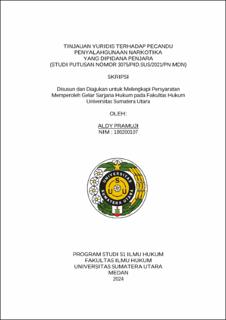| dc.description.abstract | The Indonesian government has regulations regarding Narcotics and Psychotropics, which are governed by Law No. 35 of 2009 on Narcotics. However, in its implementation, discrepancies in court decisions still occur. This happened in one of the cases at the Medan District Court (PN Medan) with verdict number 3075/Pid.Sus/2021/PN Mdn, involving the defendant Deddy Surya. Based on various factors and facts on the ground, the defendant should have met the requirements to undergo medical rehabilitation. However, in practice, the defendant was sentenced to 2 (two) years in prison.
This research aims to specifically investigate the regulatory arrangements and rehabilitation qualifications for drug addicts and abusers, to determine the achievement of punishment objectives under the Narcotics Law in Decision Number 3075/Pid.Sus/2021/PN Mdn, and to examine the legal considerations in imposing prison sentences on defendants who are required to undergo medical rehabilitation, as imposed on defendant Deddy Surya in Decision Number 3075/Pid.Sus/2021/PN Mdn. This research employs a Normative Juridical research approach, which refers to the legal norms contained in laws and regulations and court decisions, as well as the norms that apply and bind society. Data is collected through literature study techniques, comprising primary and secondary data, and analyzed using qualitative data analysis.
The research findings indicate that, in Decision Number 3075/Pid.Sus/2021/PN Mdn, the defendant met the requirements to undergo medical rehabilitation and/or social rehabilitation in accordance with Law Number 35 of 2009 on Narcotics. However, in the verdict, the judge decided to sentence the defendant to imprisonment. This decision was based on a retributive theory approach, which states that the perpetrator's actions caused the victim to suffer, and therefore, the perpetrator must also suffer. In this case, the defendant must undergo the manifestation of this theory, namely imprisonment.
In addition to the retributive theory approach, other legal considerations were found, including the judge's consideration of jurisprudence in imposing prison sentences on defendants who are required to undergo medical rehabilitation. However, such consideration cannot be the primary consideration in determining the defendant's sentence. Nevertheless, jurisprudence can ultimately support and strengthen other considerations, leading the judge to prioritize sentencing the defendant to imprisonment over medical rehabilitation and social rehabilitation. | en_US |


